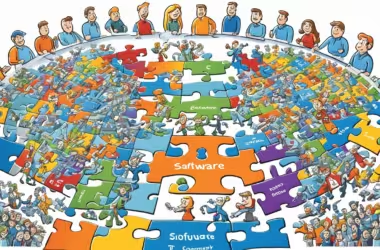The software development landscape is a living organism, constantly evolving and adapting to new technologies and user demands. This dynamism presents both challenges and opportunities for developers. To stay relevant and build a sustainable career, mastering in-demand skills is no longer a luxury, it’s a necessity. This comprehensive guide explores the key software development skills sought after in 2024, empowering you to refine your skillset and thrive in the ever-changing tech environment.
The Foundational Building Blocks: Programming Languages
Software development rests upon a solid foundation in programming languages. The software development landscape is a dynamic ecosystem. While new languages and frameworks emerge all the time, some core languages continue to hold significant importance. Mastering these foundational languages provides a strong base, while staying curious about emerging technologies prepares you for the future.. Here’s a closer look at some of the in-demand languages you should consider mastering:
- Python: Python’s versatility is a major selling point. It excels in web development with frameworks like Django and Flask, data science with libraries like NumPy and Pandas machine learning with TensorFlow and PyTorch, and even automation with tools like Selenium. Furthermore, Python’s clean syntax and extensive libraries make it a favorite for beginners and experienced developers alike.
- JavaScript: JavaScript’s dominance in front-end development remains unchallenged. Interactive web experiences rely heavily on JavaScript, and frameworks like React, Angular, and Vue.js leverage it to build complex user interfaces. A strong understanding of JavaScript and its associated frameworks is essential for any aspiring front-end developer.
- Java: Java’s robust features and mature ecosystem make it ideal for enterprise applications, big data processing with frameworks like Apache Spark, and Android development. The vast number of Java jobs available makes it a valuable skill to possess, especially for developers targeting enterprise environments.
- C#: C# forms the backbone of many .NET applications, a popular framework for building Windows applications, web services using ASP.NET, and even games with Unity. If you’re interested in developing for the Microsoft ecosystem, proficiency in C# is a must-have.
Beyond the Basics: Adaptability and Openness to Learning New Languages
While mastering core languages is essential, staying adaptable is equally important. The tech landscape is constantly evolving, and new technologies like blockchain and quantum computing might introduce entirely new languages. Here’s why an open mindset towards learning new languages is crucial:
- Emerging Technologies: Blockchain development utilizes languages like Solidity for smart contract development, while quantum computing might introduce domain-specific languages tailored to harnessing the power of quantum bits.
- Staying Ahead of the Curve: The ability to learn new languages quickly demonstrates your adaptability and willingness to embrace new technologies. This makes you a valuable asset in a rapidly changing environment.
- Addressing Niche Needs: Different projects might have specific language requirements. For instance, a mobile app targeting the Chinese market might benefit from proficiency in Kotlin, a language optimized for Android development.
- Expanding Your Skillset: Learning a new language exposes you to new programming paradigms and problem-solving approaches. This broadens your skillset and makes you a more well-rounded developer.
Building Scalable and Agile Solutions with Cloud Computing

The days of on-premise servers are slowly fading away. Cloud computing has become the de facto standard for software development, offering a plethora of advantages:
- On-Demand Resources: Cloud platforms like Amazon Web Services (AWS), Microsoft Azure, and Google Cloud Platform (GCP) provide access to computing power, storage, and other resources on-demand. This eliminates the need for upfront infrastructure investment and allows you to scale resources up or down as needed.
- Scalability: Cloud platforms are inherently scalable. Your applications can easily handle surges in traffic or data volume without performance degradation. This is a major advantage for businesses with fluctuating demands.
- Wide Range of Services: Cloud platforms offer a vast array of services beyond just compute and storage. These include serverless computing with AWS Lambda or Azure Functions, containerization technologies like Docker and Kubernetes, and cloud storage solutions like Amazon S3 or Azure Blob Storage. Familiarity with these services allows you to build modern, cloud-native applications that leverage the full potential of the cloud.
Bridging the Gap Between Development and Operations: DevOps
At the heart of DevOps lies the concept of continuous integration (CI) and continuous delivery (CD).CI automates building, testing, and integrating code changes. This ensures early detection of bugs and prevents regressions. CD automates deployment to production environments. This reduces the risk of human error and streamlines the release process.
- Benefits of DevOps: By adopting DevOps practices, teams can achieve faster release cycles, improved software quality, and increased collaboration between development and operations teams. This leads to a more efficient and agile development environment.
- DevOps Tools and Methodologies: Several tools and methodologies support DevOps practices. Here are a few popular examples:
- Version Control Systems (VCS): Git, the most popular VCS, allows developers to track changes in code, collaborate effectively, and revert to previous versions if necessary.
- CI/CD Tools: Jenkins, GitLab CI/CD, and CircleCI are popular tools that automate the CI/CD pipeline.
- Infrastructure as Code (IaC): Tools like Terraform allow developers to define infrastructure resources (servers, networks, etc.) as code. This facilitates infrastructure provisioning and management in a repeatable and automated way.
Proficiency in these tools and methodologies will make you a valuable asset in any organization embracing a DevOps culture.
Embracing the Future: Artificial Intelligence and Machine Learning
Artificial intelligence (AI) and machine learning (ML) are rapidly transforming various industries. While not every developer needs to be an AI or ML expert, a basic understanding of these technologies can be advantageous:
- Understanding AI and Machine Learning Fundamentals: A grasp of core concepts like algorithms, supervised and unsupervised learning, and neural networks will provide a solid foundation for understanding how AI and ML work http://neuralnetworksanddeeplearning.com/.
- Building AI-Powered Applications: Even without in-depth expertise, you can leverage existing libraries and frameworks to integrate basic AI functionalities into your applications. For instance, libraries like TensorFlow, PyTorch, or scikit-learn provide tools for building and deploying machine learning models https://www.tensorflow.org/, https://pytorch.org/, https://scikit-learn.org/stable/.
- The Future Landscape: Understanding AI and ML will equip you to better understand the future landscape of software development. As AI and ML become more ubiquitous, developers who can leverage these technologies will be in high demand.
The Power of Communication and Collaboration: Soft Skills
Software development is rarely a solitary endeavor. Strong communication and collaboration skills are essential for success in this field:
- Effective Communication is Paramount: The ability to clearly document code, explain technical concepts to both technical and non-technical audiences, and actively listen to feedback is absolutely crucial. Furthermore, miscommunication can lead to costly delays and misunderstandings. These communication skills are essential for any developer seeking success.
- Teamwork and Problem-Solving: Software development projects often involve working within a team. Being able to collaborate effectively, brainstorm solutions, and break down complex problems into manageable tasks is essential for successful project completion.
- Adaptability and Continuous Learning: The tech industry is constantly evolving. The ability to adapt to new technologies, learn new skills, and embrace change is a valuable soft skill for any developer
Final Thoughts
By mastering the in-demand skills explored in this guide, you’ll be well-equipped to navigate the ever-changing tech landscape and build a future-proof career in software development. Here’s a quick recap of the key takeaways:
- Develop a strong foundation in core programming languages.
- Maintain an open mind and be willing to learn new languages as needed.
- Embrace cloud computing and DevOps practices.
- Gain a basic understanding of AI and machine learning.
- Hone your soft skills, especially communication and collaboration.
Remember, the journey of learning never ends. Stay curious, keep exploring new technologies, and actively participate in the developer community. By continuously honing your skillset and adapting to change, you’ll be unstoppable in the world of software development.






